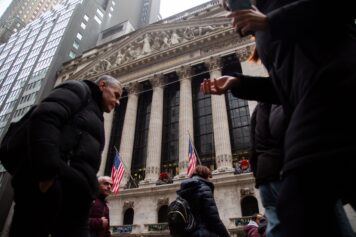By Vildana Hajric
Technology companies led gains in stocks on Friday, with traders weighing mixed signals from the peace talks between Russia and Ukraine amid volatility from expiring options. Oil remained above $100 a barrel.
Four days of gains for both the S&P 500 and Nasdaq 100 had the benchmarks posting their best weeks since November 2020, on signs that Russia’s invasion of Ukraine wasn’t something that China wanted to see.

Chinese leader Xi Jinping assured U.S. President Joe Biden that his country didn’t want war in Ukraine during a highly anticipated, two-hour video conference on Friday, their first conversation since Russia’s invasion last month. Xi told Biden that the invasion “is not something we want to see,” according to summaries released by the Chinese side, and that “the events again show that countries should not come to the point of meeting on the battlefield.”
Equity transactions spiked at the open as the expiry of stocks and index options collided with that of index futures in a quarterly event known as triple witching. Roughly $3.5 trillion of single-stock and index-level options were estimated to expire Friday. Shipping giant FedEx Corp. — a barometer of economic growth — slumped after saying it won’t meet a target for operating margins of 10% or better for its ground unit in the second half of fiscal 2022.
The yield on the benchmark three-year Treasury note moved above the rate on the five-year security for the first time since March 2020. It’s the latest in a series of so-called curve inversions — when shorter-dated yields are higher than longer-dated ones — which have been fueled by expectations for tighter policy. Inversions of some segments are also seen by some observers as trader bets on the risks of a recession or poorer growth.
Some holders of Russia’s two Eurobonds with coupons due this week said they received payment in dollars, a relief to investors who feared the nation would resort to settling the debt in rubles. By paying the bond coupons in dollars, Russia addresses concerns that it would fail to honor its debt obligations after its invasion of Ukraine left it severed from global financial markets, at least for now.
Federal Reserve Governor Christopher Waller said the central bank should consider raising interest rates by a half percentage point at coming meetings and start reducing the balance sheet by July to contain “raging” inflation. His St. Louis counterpart James Bullard said he dissented at this week’s meeting because he wanted the U.S. central bank to implement a balance-sheet reduction plan — in addition to a half percentage-point hike — adding that he favors raising rates more sharply this year than any of his colleagues. Fed Bank of Minneapolis President Neel Kashkari said the central bank should start shrinking its balance sheet as early as next meeting.
Comments:
- “The catalysts for this week’s rally seem to coalesce around news not getting worse, and a market that had priced in some worse-case scenarios,” wrote Art Hogan, chief market strategist at National Securities. “Along with the clarity from the Fed, we have also seen commodity prices stabilize a bit after their parabolic move higher over the past two weeks.”
- “Given that Fed officials are unlikely to meaningfully shift what is currently priced in for rate hikes, at least over the next few weeks, recession risk will remain low, which is important for equities, credit, bond volatility and S&P earnings estimates,” wrote Dennis DeBusschere, founder of 22V Research.
- “While recession fears have risen, there are several indicators that suggest we could be getting close to the end of what has been an uncomfortable correction,” said Lindsey Bell, chief markets and money strategist for Ally. “As the market digests information over the next several months, things could smooth out, potentially making putting money to work at currently discounted prices a wise move for investors.”
- “We advise investors to prepare for higher rates while remaining engaged with equity markets,” said Mark Haefele, chief investment officer at UBS Global Wealth Management. “We prefer a hedging strategy and selective equity exposure over exiting risk assets. In our view, energy stocks provide a hedge against risks arising from the war in Ukraine, while financials and value stocks tend to outperform in periods of rising rates.”
- “Equity market rallies will occur, and one is underway now,” said Peter Cecchini, director of research at Axonic Capital. “But we continue to suggest that market participants ought to consider them opportunities to sell or reposition equity risk.”
Some of the main moves in markets:
Stocks
- The S&P 500 rose 1.2% as of 4 p.m. New York time
- The Nasdaq 100 rose 2.1%
- The Dow Jones Industrial Average rose 0.8%
- The MSCI World index rose 0.9%
Currencies
- The Bloomberg Dollar Spot Index was little changed
- The euro fell 0.4% to $1.1052
- The British pound rose 0.2% to $1.3181
- The Japanese yen fell 0.4% to 119.13 per dollar
Bonds
- The yield on 10-year Treasuries declined two basis points to 2.15%
- Germany’s 10-year yield declined one basis point to 0.37%
- Britain’s 10-year yield declined seven basis points to 1.50%
Commodities
- West Texas Intermediate crude rose 1.5% to $104.55 a barrel
- Gold futures fell 1.2% to $1,925.30 an ounce
More stories like this are available on bloomberg.com.




